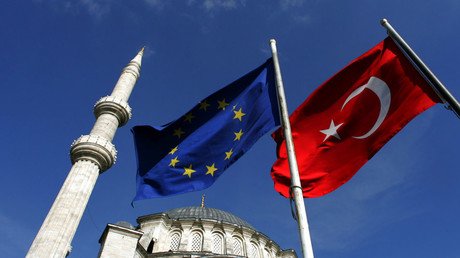Russia’s Sputnik news website abruptly blocked in Turkey after ‘legal consideration’
Russian state news agency website Sputnik has been shut down by Turkey without prior notification under “administrative measures” imposed by the country’s authorities. Turkey was recently slammed in the European Parliament for violating press freedoms.
“After technical analysis and legal consideration based on the law Nr. 5651, administration measure has been taken for this website (sputniknews.com) according to decision Nr. 490.05.01.2016.-56092 dated 14/04/2016 of the Presidency of Telecommunication and Communication,” says an error message that appears on the sputniknews.com homepage for any user trying to access the site from Turkey.
The problems with sputniknews.com were first reported at about 7:50pm local time.
Turkey’s Department of Telecommunications and Communication (TIB) has confirmed the Sputnik website has been blocked in the country.
“This morning the blocking of the site was confirmed. According to a representative from Turkey’s Telecommunications Department, they are not obliged to warn anyone when closing a site,” Sputnik’s Turkish bureau chief Tural Kerimov said.

Once the Turkish prime minister and other members of the cabinet were empowered in January 2015 to block any web resource without a court order, the Telecommunications Department could be asked to block or delete contents from a we site in a matter of four hours after receiving a notice of “national security, protection of social order, or for the prevention of crime.”
The final decision on blocking the Russian web resource, barred in accordance with Law 5651, will be made by a Turkish court, a TIB representative told RIA Novosti.
Law 5651 has been criticized repeatedly in Turkey as limiting citizens’ access to information. In March 2014, the same law was used to temporarily block Twitter and YouTube in Turkey.
The Turkish authorities’ decision to block Sputnik is “yet another act of rude censorship in the country where freedom of speech is no longer on the agenda. It simply exists no more,” RT Editor-in-Chief Margarita Simonyan said, adding that the decision to block the website looks “absurd” coming just several days after it received an award from Turkey’s Journalist Union.
The move comes on the heels of an EU resolution on Thursday, which denounced what they called a “serious backsliding on fundamental freedoms,” including the growth of clashes in the southeast of Turkey and government’s “violent and illegal take-over of several newspapers including Zaman.”
The Turkish government of President Erdogan has clamped down on a number of Turkish media outlets critical of Ankara government’s policies, however, this is the first time an international news agency has been silenced.
Turkey has more blocked Twitter and Facebook more than once, arrested foreign journalists accusing them of terrorism, yet one of the most shocking episodes of Turkish censorship so far has been the raid on the Today’s Zaman headquarters in March, described as “a totally barbaric act” by its ex-editor in chief Bulent Kenes.
“The government power [in Ankara] can be used to supress any opinion, including Sputnik or domestic opinion, the government doesn’t want to hear,” professor of social and political history at the University of Michigan Ronald G. Suny told RT, describing the “harsh campaign” against journalists in Turkey.
“There’s been a real harsh campaign lately against journalists, against political activists, against academicians, people who have signed the petition trying to get the Turkish government to stop their brutal war against the Kurds in Southeastern Turkey,” Suny added. The signing of the petition by journalists, academicians and intellectuals “has been seen by the government, in an extreme and very rash move, as treason…”
MORE: @SputnikInt blocked days after winning Turkish Journo Assn award https://t.co/xd5zlg0ih5#ErdoganDisapprovespic.twitter.com/DOxJXGI1Zg
— Sputnik (@SputnikInt) April 14, 2016
The Turkish President is one of those leaders who reject any criticism and “feel humiliated by it,” Suny believes, saying that Erdogan’s criminal complaint as a response to a satirical poem about him written by a German comedian only proves the case.
“Every politician has to take blows, that comes with the territory. Think of President Obama – how much he is abused, or Putin as well. So Erdogan is no different and yet he’s reacted so fiercely. This satire, this funny song which is really amazing and quite hilarious… it’s too close to the bone for him.”
“[Erdogan] has overreacted, calling in the German ambassador, putting pressure on Chancellor Merkel to somehow withdraw this thing…That would be against the Constitution of Germany. It’s not the way democratic governments work and it’s not going to happen.”
UPDATE: #SputnikTurkey website blocked soon after #PutinDirect Q&A https://t.co/xd5zlg0ih5#CensorshipMuchpic.twitter.com/295Vli60va
— Sputnik (@SputnikInt) April 14, 2016













